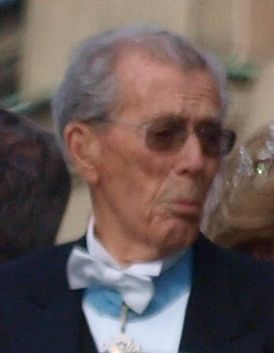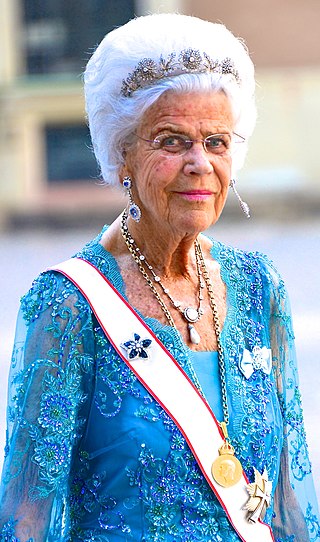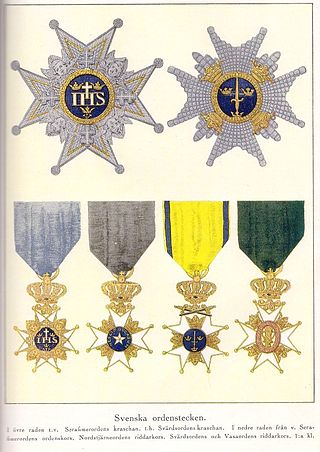
Victoria, Crown Princess of Sweden, Duchess of Västergötland is the heir apparent to the Swedish throne, as the eldest child of King Carl XVI Gustaf. If she ascends to the throne as expected, she would be Sweden's fourth queen regnant and the first since 1720. Her inheritance is secured by Sweden's 1979 Act of Succession, the first law in Western Europe to adopt royal absolute primogeniture.

Carl XVI Gustaf is King of Sweden. He ascended the throne on the death of his grandfather, Gustaf VI Adolf, on 15 September 1973.

Silvia is Queen of Sweden as the wife of King Carl XVI Gustaf. She has held this title since her marriage to Carl Gustaf in 1976. The king and queen have three children: Crown Princess Victoria, Prince Carl Philip, and Princess Madeleine.

Princess Madeleine of Sweden, Duchess of Hälsingland and Gästrikland is the second daughter and youngest child of King Carl XVI Gustaf and Queen Silvia. Upon her birth, she was third in line of succession to the Swedish throne; currently, she is eighth. Princess Madeleine is married to British-American financier Christopher O'Neill. They have three children, Princess Leonore, Prince Nicolas and Princess Adrienne.

Prince Bertil, Duke of Halland, was a member of the Swedish royal family. He was the third son of King Gustaf VI Adolf and his first wife, Princess Margaret of Connaught, as well as the uncle of King Carl XVI Gustaf of Sweden, Queen Margrethe II of Denmark and Queen Anne-Marie of Greece. From 1973 to 1979 he was heir presumptive to his nephew King Carl XVI Gustaf and the Swedish throne.

Carl Johan Arthur, Prince Bernadotte, Count of Wisborg, was the fourth son and fifth and youngest child of King Gustaf VI Adolf of Sweden and his first wife, Princess Margaret of Connaught.

Princess Christina, Mrs. Magnuson, is a member of the Swedish royal family. She is the fourth child of Prince Gustaf Adolf, Duke of Västerbotten, and Princess Sibylla of Saxe-Coburg and Gotha, and the youngest of the four older sisters of King Carl XVI Gustaf. She generally uses the name Christina Magnuson.

Peter "Pirre" Wallenberg Sr. was a Swedish business leader who was chairman of Investor AB for ten years.

The Royal Order of the Sword is a Swedish order of chivalry and military decoration created by King Frederick I of Sweden on 23 February 1748, together with the Order of the Seraphim and the Order of the Polar Star. The motto of the order is in Latin: Pro Patria.
A royal family order is a decoration conferred by the head of a royal family to their female relations. Such an order is considered more of a personal memento than a state decoration, although it may be worn during official state occasions.

The Royal Order of the Seraphim is a Swedish order of chivalry created by King Frederick I on 23 February 1748, together with the Order of the Sword and the Order of the Polar Star. The order has only one class with the dignity of Knight, and is the foremost order of Sweden.

The Royal Order of the Polar Star, sometimes translated as the Royal Order of the North Star, is a Swedish order of chivalry created by King Frederick I on 23 February 1748, together with the Order of the Sword and the Order of the Seraphim. The Order of the Polar Star is intended as a reward for Swedish and foreign "civic merits, for devotion to duty, for science, literary, learned and useful works and for new and beneficial institutions".

H. M. The King's Medal, earlier known as the Court Medal, is a Swedish honour that may be bestowed upon Swedish and foreign citizens. The medal was created in 1814 and is awarded in different sizes in gold and silver with chain or ribbon. This medal is not awarded in classes but in sizes. The 12th size is the largest and is worn around the neck on a chain or ribbon. The 8th and 5th size are worn from the left breast suspended by a ribbon, after the Seraphim Medal.

Prince Daniel, Duke of Västergötland, is a member of the Swedish royal family by marriage to Victoria, Crown Princess of Sweden making Daniel the likely next Prince consort of Sweden. Prior to his marriage to the heir apparent to the Swedish throne, he was a personal trainer and gym owner and ran a company called Balance Training with three gyms in central Stockholm.

Gustaf VI Adolf was King of Sweden from 29 October 1950 until his death in 1973. He was the eldest son of Gustaf V and his wife, Victoria of Baden. Before Gustaf Adolf ascended the throne, he had been crown prince for nearly 43 years during his father's reign. As king, and shortly before his death, he gave his approval to constitutional changes which removed the Swedish monarchy's last nominal political powers. He was a lifelong amateur archeologist particularly interested in Ancient Italian cultures.

The Orders, decorations, and medals of Sweden have a historical basis, reaching back to the 1561 founding of the extinct Order of the Savior. The Royal Order of Knights of Sweden were only truly codified in the 18th century, with their formal foundation in 1748 by Frederick I of Sweden. Significant reforms in 1974 changed the conditions and criteria under which many orders and decorations could be awarded.

Princess Sofia of Sweden, Duchess of Värmland, is a member of the Swedish royal family. Before marrying Prince Carl Philip and becoming a princess of Sweden in 2015, Sofia was a glamour model and reality television contestant. They have three sons, Prince Alexander, Prince Gabriel and Prince Julian, who are fifth, sixth and seventh in the line of succession to the Swedish throne, respectively.

Hédi Fried was a Swedish-Romanian-Hungarian author and psychologist. A Holocaust survivor, she passed through Auschwitz as well as Bergen-Belsen, coming to Sweden in July 1945 with the boat M/S Rönnskär.


















